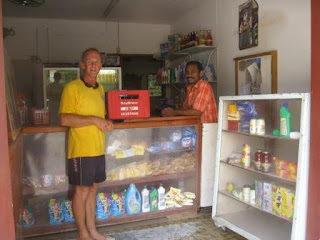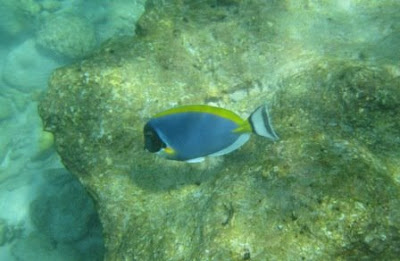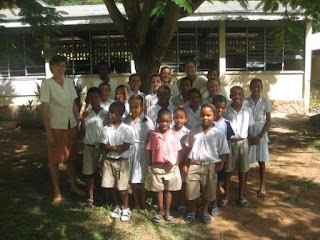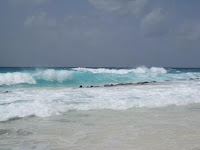The day to day living and working life here is so different than back home, which you may well think is bloody obvious, Somerset Levels to Tropical Island, duhhhh!. Of course I knew it would be different, we researched the job in great depth for some months before our departure, but there are some things you only find out about, by actually doing and living it.
Its hot and sticky! another duhhhh moment? not really. The tropical climate is intense, it slows you and makes you tried, all stuff you could imagine sat at home in a cold grey British winter. The working week is 7am to 5pm with 2hours lunch break at 12 to 2, well, being used to 30mins, I thought I’ll show um, um being the rangers, sat on their asses half the day, so I just took my half hour break a

nd went back to work, this lasted no more than a week, I was knackered, and I knew if I carried on I’d collapse, each person is different, but each person only has his or her energy supply for that day, if you don’t pace yourself and use it to quickly, your body says no more and stops, if you let yourself get to that state, it takes a couple of days to feel right again. Last laugh with the rangers on that one.
Washing, again I was fully aware it was going to be humid, and that my cloths and body just won’t dry out completely, but what no one tells you, no matter how much, or how often you wash your cloths, they smell like a dogs slept on them, really embarrassing, at meetings in the main office, the big boss looking around for fido then realising it’s me and Sal. I was then going to tell you about the merits of baby powder and what it prevents, but Sal vetoed that, saying “you can’t say that my parents read this” so I’ll just say, if you’re going to live anywhere with very high humidity, and you would prefer not to grow mushrooms on certain sensitive parts of your body, take lots of talcum powder.
Staff, huge culture clash, as again you would expect (have to be careful here), firstly let me say the staff are extremely talented, they are weaned on the water and as a result are fantastic boatmen, they have a natural confidence that comes across so well with people which makes them really great tour guides. But this is Africa and people and culture are different, and believe me I’m not trying to say who’s right or wrong here, but we’re paid to do a job and we try to do our best, which sometimes means we clash with the rangers. We’re brought up in the UK, with a certain work ethic, (well, some of us) that the job is all important

, and we try hard to do are best, as a result, most of work longer hours than we a paid for, it’s just the done thing. Not here, no more said.
Shopping, here again we new that things would be tuff, no Tesco’s in the Seychelles.
There’s nothing, it took 5 weeks to get a shaving mirror, having not seen myself for 5 weeks it did come as quite a shock, I’d forgotten how ugly I was! No writing paper, diary(had to make one out of a calendar), cloths, sun cream, screws, in fact most things, and of course, no food!
But if it wasn’t different, would we have come?

 Threadfin butterfly fish
Threadfin butterfly fish Picasso fish
Picasso fish  Pallett Surgeon fish
Pallett Surgeon fish Racoon butterflyfish
Racoon butterflyfish  Powderblue surgeon fish
Powderblue surgeon fish Selection
Selection Threadfin butterfly fish
Threadfin butterfly fish Picasso fish
Picasso fish  Pallett Surgeon fish
Pallett Surgeon fish Racoon butterflyfish
Racoon butterflyfish  Powderblue surgeon fish
Powderblue surgeon fish Selection
Selection down the beach. They looked like small black currants in the sand - dotted unevenly and moving. I ran to get the camera from the office - I ran as fast as my bare feet could carry me over the uneven terrain. There was no time to waste, it was like I wanted to freeze time, to stop the hatchlings, to hold the moment, but I couldn't. I got back to the beach as quick as possible, completely out of breath and so excited I could barely speak. The sight in front of me was indescribable, watching these small hatchlings about the size of 50p pieces making their way down the beach, coping with the dangers in front of them.
down the beach. They looked like small black currants in the sand - dotted unevenly and moving. I ran to get the camera from the office - I ran as fast as my bare feet could carry me over the uneven terrain. There was no time to waste, it was like I wanted to freeze time, to stop the hatchlings, to hold the moment, but I couldn't. I got back to the beach as quick as possible, completely out of breath and so excited I could barely speak. The sight in front of me was indescribable, watching these small hatchlings about the size of 50p pieces making their way down the beach, coping with the dangers in front of them.  iformly brown. They kind of ‘paddle’ along the sand, using their flippers to waddle, but although clumsy they are quite swift and taking a picture of them was quite a challenge. Foot prints alone presented them with a major upheaval, they struggled to avoid crab holes, and fortunately we were there just to give them a little helping hand. The excitement amongst the group of us was infectious, whilst we wanted the small turtles to make their way and to go out to sea, we wanted to keep watching them and didn't want it to end.
iformly brown. They kind of ‘paddle’ along the sand, using their flippers to waddle, but although clumsy they are quite swift and taking a picture of them was quite a challenge. Foot prints alone presented them with a major upheaval, they struggled to avoid crab holes, and fortunately we were there just to give them a little helping hand. The excitement amongst the group of us was infectious, whilst we wanted the small turtles to make their way and to go out to sea, we wanted to keep watching them and didn't want it to end. ndividuals will hatch later and follow on. It was around 7pm, the sun had only just gone down and so it was still quite light, which we never expected. I must admit I always thought that may be we would never actually see such a sight, or if we did it would be under muffled torch light (so not to distract the turtles) and never thought it would be in almost day light - what a privilege. When all the hatchlings had made their way we stood and watched out to sea, as the last of the daylight disappeared, realising that we had just experienced something very, very special and we looked back and saw all the tracks in the sand...
ndividuals will hatch later and follow on. It was around 7pm, the sun had only just gone down and so it was still quite light, which we never expected. I must admit I always thought that may be we would never actually see such a sight, or if we did it would be under muffled torch light (so not to distract the turtles) and never thought it would be in almost day light - what a privilege. When all the hatchlings had made their way we stood and watched out to sea, as the last of the daylight disappeared, realising that we had just experienced something very, very special and we looked back and saw all the tracks in the sand... 
 nd went back to work, this lasted no more than a week, I was knackered, and I knew if I carried on I’d collapse, each person is different, but each person only has his or her energy supply for that day, if you don’t pace yourself and use it to quickly, your body says no more and stops, if you let yourself get to that state, it takes a couple of days to feel right again. Last laugh with the rangers on that one.
nd went back to work, this lasted no more than a week, I was knackered, and I knew if I carried on I’d collapse, each person is different, but each person only has his or her energy supply for that day, if you don’t pace yourself and use it to quickly, your body says no more and stops, if you let yourself get to that state, it takes a couple of days to feel right again. Last laugh with the rangers on that one. , and we try hard to do are best, as a result, most of work longer hours than we a paid for, it’s just the done thing. Not here, no more said.
, and we try hard to do are best, as a result, most of work longer hours than we a paid for, it’s just the done thing. Not here, no more said.












































































